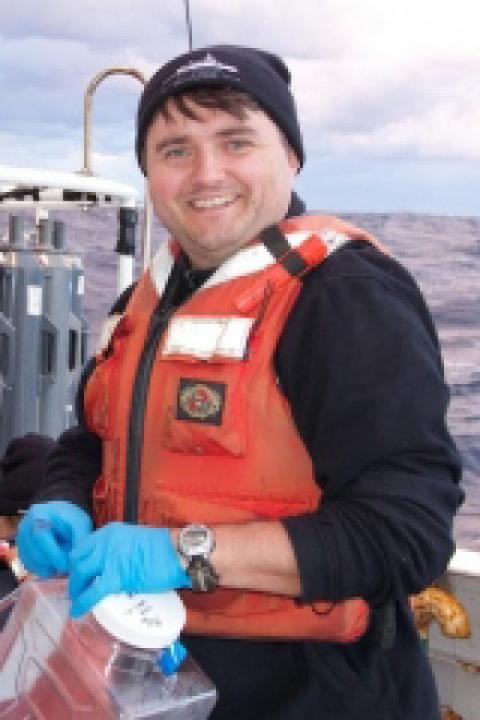
Kai Ziervogel
Courses Taught
- ESCI 501: Introduction to Oceanography
- INCO 590: Student Research Experience
- INCO 790: Advanced Research Experience
Education
- Ph.D., University of Rostock
- M.S., University of Rostock
Research Interests
- Biological Oceanography
- Geochemistry
Selected Publications
Dykens, K., Letscher, R., Matsuoka, A., & Ziervogel, K. (2025). New insights on the deep alkaline phosphatase paradox from a site in the Northeastern Pacific Ocean. Deep Sea Research Part I: Oceanographic Research Papers, 215, 104419. doi:10.1016/j.dsr.2024.104419
Ross, J., Kinner, N., Saupe, S., & Ziervogel, K. (2024). Sediment ballast accelerates sinking of Alaska North Slope crude oil measured ex situ with surface water from Cook Inlet. Environmental Research Communications, 6(7), 075032. doi:10.1088/2515-7620/ad6125
Ziervogel, K., Kehoe, S., De Jesus, A. Z., Saidi-Mehrabad, A., Robertson, M., Patterson, A., & Stubbins, A. (2024). Microbial interactions with microplastics: Insights into the plastic carbon cycle in the ocean. Marine Chemistry, 262, 104395. doi:10.1016/j.marchem.2024.104395
Caruso, G., & Ziervogel, K. (2022). Distribution and Metabolic Activities of Marine Microbes in Response to Natural and Anthropogenic Stressors. JOURNAL OF MARINE SCIENCE AND ENGINEERING, 10(8). doi:10.3390/jmse10081119
Ziervogel, K., Kamalanathan, M., & Quigg, A. (2022). Hydrolysis of Methylumbeliferyl Substrate Proxies for Esterase Activities as Indicator for Microbial Oil Degradation in the Ocean: Evidence from Observations in the Aftermath of the Deepwater Horizon Oil Spill (Gulf of Mexico). JOURNAL OF MARINE SCIENCE AND ENGINEERING, 10(5). doi:10.3390/jmse10050583
Kleindienst, S., Seidel, M., Ziervogel, K., Grim, S., Loftis, K., Harrison, S., . . . Joye, S. B. (2015). Chemical dispersants can suppress the activity of natural oil-degrading microorganisms. PROCEEDINGS OF THE NATIONAL ACADEMY OF SCIENCES OF THE UNITED STATES OF AMERICA, 112(48), 14900-14905. doi:10.1073/pnas.1507380112
Cardman, Z., Arnosti, C., Durbin, A., Ziervogel, K., Cox, C., Steen, A. D., & Teske, A. (2014). Verrucomicrobia Are Candidates for Polysaccharide-Degrading Bacterioplankton in an Arctic Fjord of Svalbard. APPLIED AND ENVIRONMENTAL MICROBIOLOGY, 80(12), 3749-3756. doi:10.1128/AEM.00899-14
Martinez-Garcia, M., Brazel, D. M., Swan, B. K., Arnosti, C., Chain, P. S. G., Reitenga, K. G., . . . Stepanauskas, R. (2012). Capturing Single Cell Genomes of Active Polysaccharide Degraders: An Unexpected Contribution of Verrucomicrobia. PLOS ONE, 7(4). doi:10.1371/journal.pone.0035314
Ziervogel, K., McKay, L., Rhodes, B., Osburn, C. L., Dickson-Brown, J., Arnosti, C., & Teske, A. (2012). Microbial Activities and Dissolved Organic Matter Dynamics in Oil-Contaminated Surface Seawater from the Deepwater Horizon Oil Spill Site. PLOS ONE, 7(4). doi:10.1371/journal.pone.0034816
Passow, U., Ziervogel, K., Asper, V., & Diercks, A. (2012). Marine snow formation in the aftermath of the Deepwater Horizon oil spill in the Gulf of Mexico. ENVIRONMENTAL RESEARCH LETTERS, 7(3). doi:10.1088/1748-9326/7/3/035301